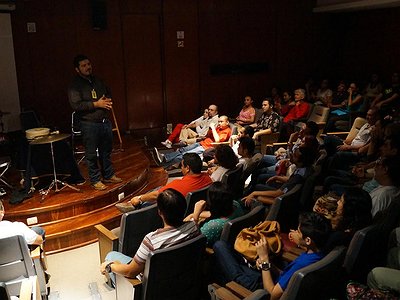Part 3
How do you see the relationship between music and the location it's performed at? What are special characteristics of your concert space, would you say?
In improvised music, the venue is almost as important as the audience in terms of shaping the sound and the music, not just logistically but aesthetically. Good musicians always listen to the room they’re in and adapt accordingly. Since we don’t have a single concert space, and instead operate all over our city (and for the first time this year, in other cities in Mexico like Queretaro), we have the liberty – and challenge – of choosing the most appropriate venue for each specific project, whether that means a formal theater/museum setting for a chamber improv show, a sleazy warehouse for a noise show, a metal venue full of black-shirt weirdos like us for frantic free jazz shows, a small gallery room for a quiet Wandelweiser-esque set, an unexpected choice of venue in order to surprise people and defy their expectations, etc.
How would you define what differentiates a successful live performance from a poor one? What can artists do from your point of view to improve their live act?
For the first question, my answer is a sense of electricity being created, a set of questions being raised (either answered or not), a tingly feeling in the gut, or the sense of having listened to something that would not have been the same had you not been in that exact place at that exact time. And for the second question, this may sound old fashioned once again, but to me the only proper way for artists to improve their live act is to play and sound better, whether that means listening to more music than ever and expanding their horizons, or ceasing to listen to other people’s music and focus on their own ideas, or composing more, or improvising more, or mastering their instrument for once, or discarding their old instrument and finding/building a new one from scratch, or upgrading their gear/PA/backline, or instead playing acoustic… I am personally very doubtful about the possibilities of success of interdisciplinary collaborations with improvised music, so that’s not something we have fostered in my festival or concert series. There are other platforms or series focused on interdisciplinary works that would be more appropriate for that.
Live performances are often considered as one-way forms of communication. In which way, however, can an audience actively contribute to them as well?
It’s hard for me to think of any genre where the audience has a bigger active role than in improvised music. Whether it’s people closing their eyes to listen more deeply, or banging their heads as if they were in a heavy metal concert, or getting up from their seats and dancing/raising their fists, or shouting exclamations of support during the exciting parts, or even clapping after a raucous solo, or maintaining a respectful silence in the quiet parts instead of quickly assuming that the set is over and starting to clap, the audience feeds the musicians, who in turn may increase their energy level or their focus in order to better shape the music. In general, whenever an audience listens well, I find that the music is better and flows with more grace.
The role of the arts is always subject to change. What's your view on the (e.g. political/social/creative) tasks of the arts today and how do you try to meet these goals in your own work?
This is a very complex topic. On the one hand, I feel that if people really want to have a direct social or political impact, neither music or any artistic discipline are direct ways of achieving those goals, which would be much better served by working instead on human rights, or resource management or whatever it is that you want to help with. The beauty of art, for me, lies in its obliqueness, and its capacity to both encompass and surpass our day-to-day miracles and miseries. But on the other hand, it also upsets me that, for most people in the arts scene, being “political” equals having liberal, or so-called “progressive” values. A lot of the music I like – from power electronics to black metal, and many things in between – has political or social postures that could horrify most “liberal” people. That’s fine by me, since I don’t listen to music to reinforce my moral or political values. But of course, I also acknowledge the fact that the origins of free jazz, one of the musical cultures that interests me the most, are intrinsically related to the struggle of black people in the U.S. and their never-ending fight for equal rights, and I appreciate the fact that music, to paraphrase Fela Kuti, can be a weapon for political expression.
Music-sharing sites and -blogs as well as a flood of releases and more and more live performances in general are presenting both listeners and artists with challenging questions. What's your view on the value of music today?
The digitalization of music has certainly changed the value of music recordings. I guess that, as most label owners, it is very hard not to be frustrated when your unreleased album gets leaked on Soulseek or Eastern European file-sharing sites, which undoubtedly affects sales. Of course, I don’t want to be a hypocrite, as I use Soulseek or file-sharing blogs myself, but I also spend now more money than ever on buying records (not to mention in organizing concerts and releasing cassettes and CDs), including many records I did not stream online before buying. Whereas a lot of young people who seem to be the hardcore Spotify or Bandcamp users never seem to buy CDs, or even digital files. I think that people need to be reminded that supporting a music scene means spending at least a little bit of money in it, by attending concerts and paying the door fee, or buying tapes or CDs or vinyls or shirts or merchandise, or donating to a crowd-funding campaign or becoming a small patron of the arts or whatever. One of our main precepts for Lengua de Lava was that we would not be a netlabel putting out files that may end up in poorly labeled folders in dusty hard drives, but instead a proper label that creates beautiful physical objects that will possibly blow your mind (or, at least, that you’ll want to return to). I guess time will decide if we can accomplish and maintain that, or not.







